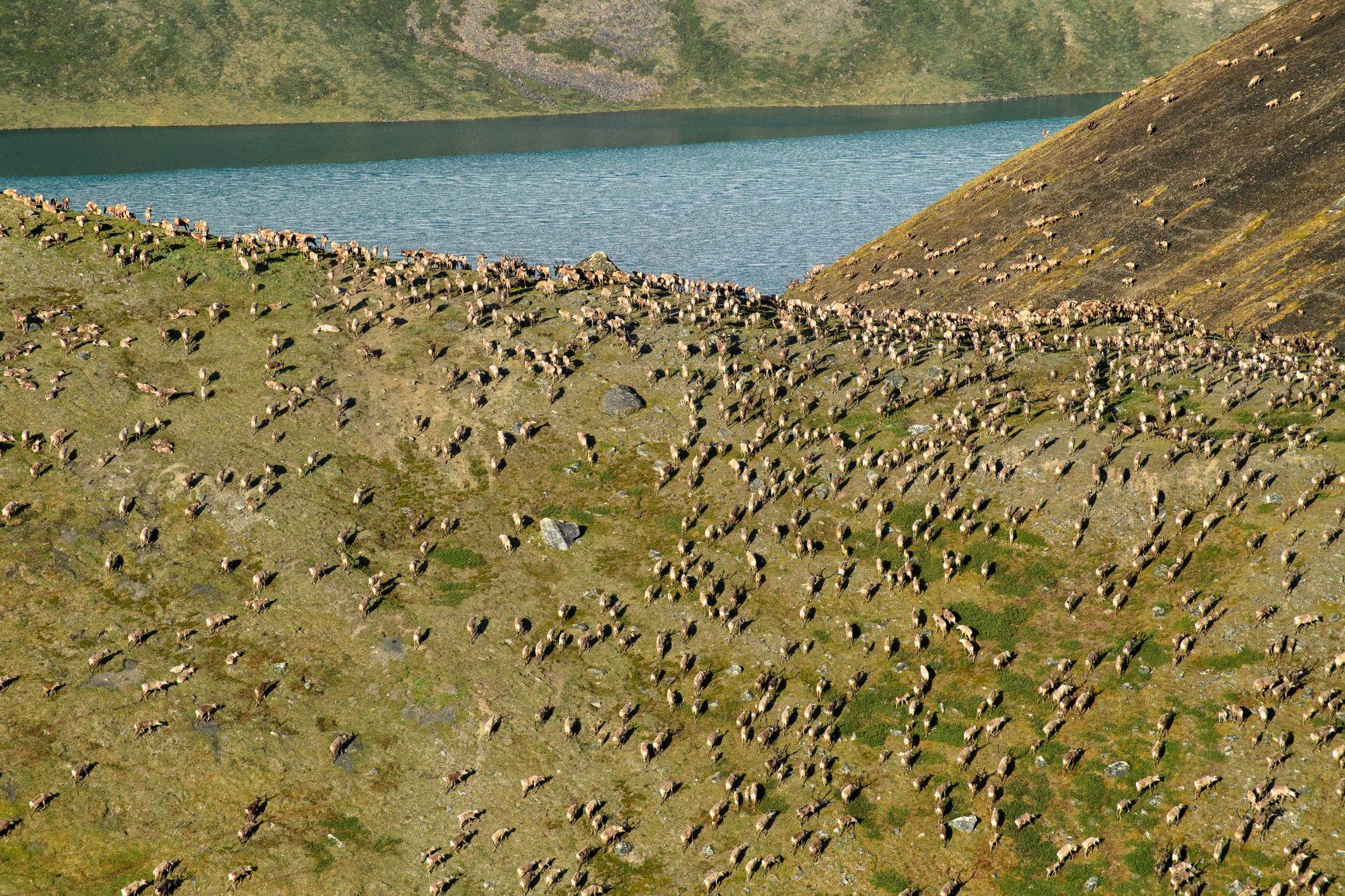
The 50th Anniversary series: Landmark cases
in 50th anniversary, America's Arctic, Bristol Bay, Clean Air and Water, Wild Lands & Wildlife
By Dawnell Smith
A winning lawsuit can set the stage for legal interpretations for years or decades to come, and establish constitutional law, and feel like a monumental win for the underdogs. Trustees’ cases over the last 50 years yielded successes of all kinds. Our “small but mighty” nonprofit law firm has left a mark worthy of our founders’ vision—giving a legal voice in the effort to protect Alaska’s lands, water, communities, and abundance of life.
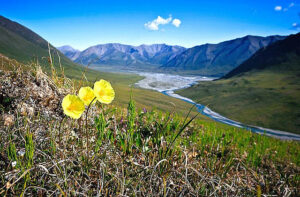
Arctic National Wildlife Refuge. USFWS photo.
Our advocacy and strategy legacy spans way beyond the courtroom, but this month we want to focus on some of the landmark cases over the last 50 years. This is not a comprehensive or complete list by any measure, but it shows the power of tenacity, commitment, and working together.
1974 to 1984—stopping the privatization of Alaska
When Trustees for Alaska was established on December 16, 1974, work had already begun on the trans-Alaska pipeline, and Trustees focused on mitigating the environmental impacts of the project and ensuring compliance with the law. The push to industrialize and privatize Alaska had already begun.
One profoundly important legal success involved a case challenging a ballot initiative, known as the Alaska Homestead Act, from privatizing up to 30 million acres of state land by distributing it to residents who had lived in Alaska for at least three years. The act would have given 40 acres to anyone who qualified, effectively putting “no trespassing” signs across vast expanses of Alaska.
Trustees and other individuals led by Edgar Bailey challenged the initiative in court in Thomas v. Bailey, arguing that the initiative created an unconstitutional appropriation of state lands that, as with money, could only be enacted by the legislature, not by the general public through an initiative. The Alaska Supreme Court agreed, invalidating the initiative.
That early Trustees’ case prevented the widespread privatization of public lands and preserved access to state land for all.
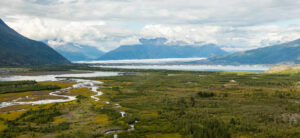
Chugach State Park, photo by Diego Delso.
1984-1994—taking on Interior and the State of Alaska
Trustees sued the Interior Department and State of Alaska repeatedly to defend public lands, animals, and the ways of life of Alaskans.

The Arctic National Wildlife Refuge. Photo by Lisa Hupp, USFWS.
In Trustees for Alaska v. Watt, we challenged then Sec. James Watt’s effort to transfer management of the Arctic National Wildlife Refuge from the U.S. Fish and Wildlife Service to the U.S. Geological Survey. We argued decisively that this action violated the National Refuge Act and Alaska National Interest Lands Conservation Act and was beyond the Interior Secretary’s statutory authority. This litigation affirmed that Fish and Wildlife holds authority for managing refuges.
Trustees also charged the Interior Department with violating the law when conducting an oil and gas lease sale in the Bristol Bay region in Village of False Pass v. Watt. The court ruled in our favor, determining that Sec. Watt violated the Endangered Species Act by failing to take reasonable actions to protect gray whales and right whales. The success of this case walked back the lease sale and compelled Interior to buy leases back. For Bristol Bay communities, this meant keeping a region vital to local fishing economies and ways of life free of oil and gas.
Another important case, Trustees v. State of Alaska Department of Natural Resources, led to the Alaska Supreme Court ruling in 1987 that the State had to establish rents and royalties for mining on state land. Prior to this litigation, the state gave away land to mining companies and those companies paid nothing while leaving behind toxic waste, destroyed landscapes, and impacted animals and communities.
1994-2024—clean water for all
We took on even more major proposals in the 90s.
In our case, Trustees v. Department of Natural Resources, the court ruled in our favor by requiring the agency to consider caribou impacts before making a “best interest” conclusion around a project proposal; in Trustees v. Gorsuch, the court required the U.S. Environmental Protection Agency to consider the cumulative effects of all mining activities when looking at a surface coal mining proposals; and in Trustees v Hickel, our lawsuit prevented then Gov. Wally Hickel from building the Copper River highway project.
In this latter case, we sued the State of Alaska in 1994 after Hickel ordered the Alaska Department of Transportation to build the road in violation of federal law. Our lawsuit prompted the U.S. Army Corps of Engineers to issue a cease-and-desist order and subsequently join our lawsuit as plaintiffs.
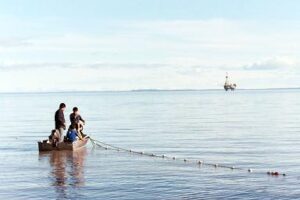
Picking fish at Robert’s Creek fish camp on Cook Inlet. Photo courtesy of ADFG.
We took on major oil companies, challenging over 4000 Clean Water Act violations against Cook Inlet oil and gas facilities. The case, Greenpeace v Union Oil Co., resulted in a monetary settlement in 1995 that established the citizen nonprofit group Cook Inletkeeper as an organization monitoring the health of the Inlet.
Other litigation, as intervenors in Alaska State Snowmobile Association Inc. v Babbitt, led to the establishment of a snowmachine ban in 2 million acres of Denali National Park and, as intervenors in United States v. Alaska, confirmed that coastal tidelands off the Arctic National Wildlife Refuge are subject to federal jurisdiction and thus excluded from state oil and gas leasing.
2004-2014—salmon, sea lions, and whales
The 2000s brought court actions aimed at safeguarding fish and marine mammals, while also grappling with land use issues.
Trustees’ litigation helped protect Steller sea lions from fishing trawling in the Bering Sea (Greenpeace, et al. v. National Marine Fisheries Service) and kept a commercial hatchery project proposal that clearly violated the Wilderness Act from happening at Tustumena Lake in the Kenai National Wildlife Refuge. (The Wilderness Society v. U.S. Fish and Wildlife Service).
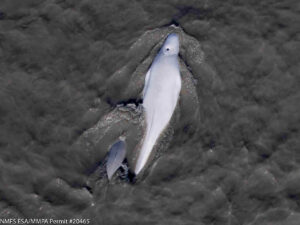
Cook Inlet Beluga and calf. Photo courtesy of NOAA.
One truly triumphant moment came when we finally got Cook Inlet beluga whales listed as an endangered species after a decade of effort (Cook Inlet Beluga Whale v. Gutierrez). This still-vulnerable population of whales has lived under enhanced projections ever since. In a related effort, Trustees went to court to require zero discharge of waste at the then new Osprey oil platform in Cook Inlet. Unfortunately, other oil and gas platforms in Cook Inlet continue to be allowed to discharge waste into Cook Inlet, a practice that is not allowed anywhere else in the entire country.
Trustees also took on local water quality concerns in Resurrection Bay Conservation Alliance v. City of Seward, resulting in the requirement that the Seward boat repair yard get a Clean Water Act permit to control discharges before entering Resurrection Bay. We also succeeded in ensuring that there was an environmental review and restrictions in place for ATV use in the Nabesna Road area of Wrangell-St. Elias National Park.
One important case in which we intervened, West v. State of Alaska Board of Game, pertained to the management of wild animals through state-sanctioned practices like aerial shooting and allowing the killing of bears using bait. This case’s ruling established that the constitutional principle of sustained yield—the number of animals that allows the species to sustain itself—applies to predator animals like wolves and bears as well as to prey animals like moose and caribou.
Another court action made big news because of the family involved. Trustees defended the U.S. National Park Service in Hale v. National Parks Conservation Association, which challenged the agency’s prohibition on illegal bulldozing of an access road to the Pilgrim property in Wrangell-St. Elias. The case reinforced federal authority over national park lands.
2014-2024—#StopWillow and the human rights and climate fight
Our fifth decade shows in clear ways how the litigation we brought early on has rolled into the subsequent decades and now to the next 50 years. We go to court to hold ground and make inroads in protecting places like Bristol Bay, the Arctic, and landscapes across the state that are vital to addressing climate and providing what all living beings need to thrive.
One big case, Resisting Environmental Destruction on Indigenous Lands., et al. v. Irwin, established that the Alaska Constitution requires cumulative impacts analysis at the lease sale stage of oil and gas decisions. The case involved an agency authorization of a Beaufort Sea Areawide Oil and Gas lease sale without proper analysis of how the cumulative effects of those leases and resulting drilling operations would impact the region and local communities.
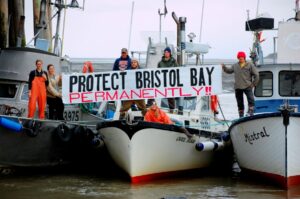
Photo by Luke Strickland.
Meanwhile, our lawsuits around the proposed Pebble mine continued to fend off permits, as they have for well over a decade. That’s what the law can do—hold off projects while enduring protections take root. Early in the decade we succeeded in our case, Nunamta Aulukestai, et al. v. State of Alaska, to force the State of Alaska to provide public notice before allowing extensive and damaging mining exploration in the areas of the Pebble mine proposal.
Years later, in 2023, after decades of advocacy and litigation, the U.S. Environmental Protection Agency used Section 404(c) of the Clean Water Act to prohibit any mine of the size and scale of the Pebble proposal at the headwaters of Bristol Bay. Tribes, local communities, conservation groups and Alaskans spoke up for Bristol Bay and helped drive this outcome, telling the agency what it already knew—a Pebble-like mine would be catastrophic to the region’s salmon runs and communities. Though we are still in court defending the agency’s decision, the current hard-won protections for Bristol Bay truly represent a massive victory for Alaska.
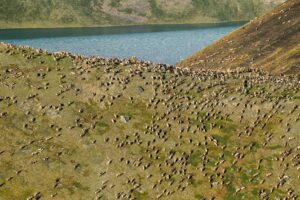
Caribou in the Arctic Refuge. Photo by Florian Schulz
During this period, we also again defended the Arctic Refuge in Gwich’in Steering Committee v. Bernhardt, a case filed in 2021 and still being litigated. That legal action compelled the Biden administration to suspend and then cancel oil and gas leases in the Refuge; we also intervened in cases to defend the suspension and cancellation of leases.
In a big win for climate and the Arctic, we stopped the first approval of the massive Willow oil and gas project in the western Arctic and later took the Biden administration to court (Sovereign Iñupiat for a Living Arctic, et al. v. U.S. Bureau of Land Management, et al.) when it also approved Willow. ConocoPhillips is now beginning the second winter of construction work on the project, even as we wait for court decisions around our Biden-era lawsuit.
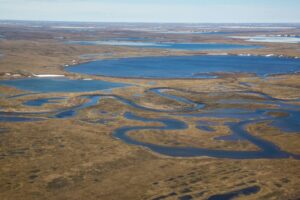
The 22.8 million acre Western Arctic, includes important nesting habitat for migratory birds. BLM photo by Bob Wick.
The cumulative impacts!
One thing we’ve learned over 50 years is that the good news accumulates, steadily protecting the places that provide so much nourishment for so many living beings and ways of life. Many cases filed in the last decade will carry into the next, with new ones right behind them.
As we look to the next 50 years, we honor the foundation upon which we stand—a clear vision for providing a legal voice and the determination and commitment to do the work alongside all of you.


